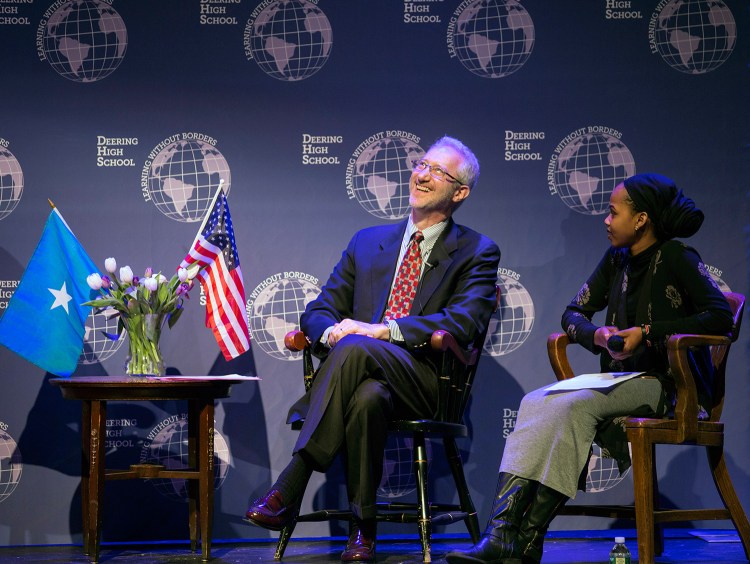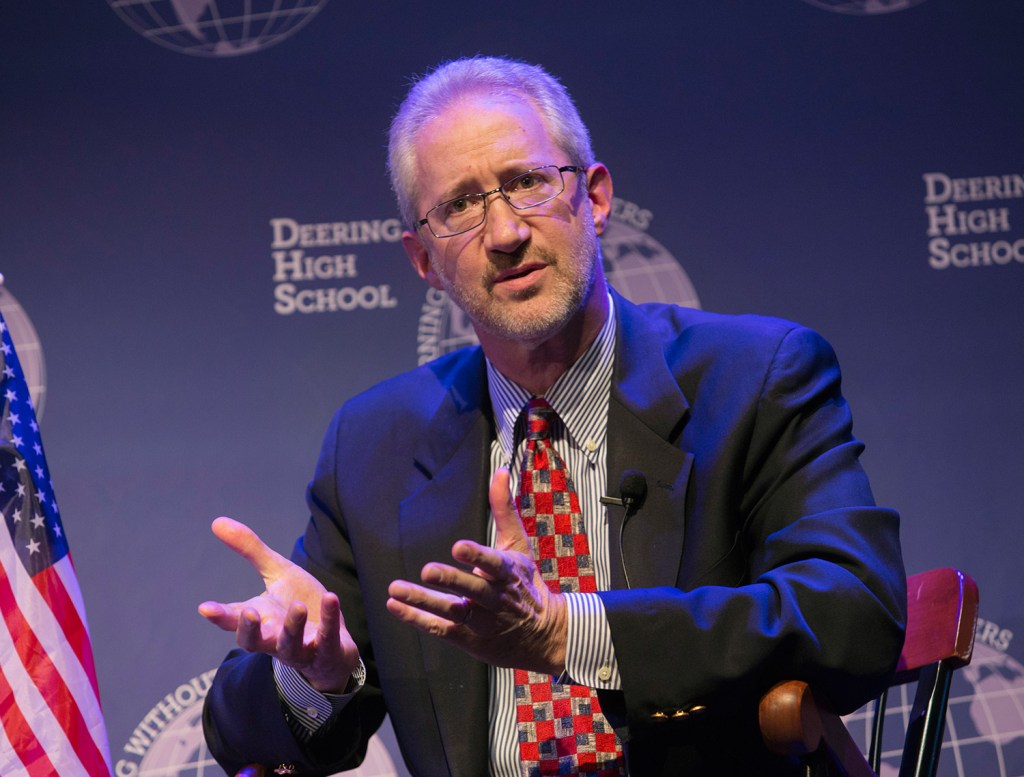The United States’ first ambassador to Somalia in a quarter-century began a stateside trip Wednesday by visiting Portland’s Deering High School.
Stephen Schwartz, a career member of the State Department’s Foreign Service, was appointed to his post by then-President Barack Obama in 2016. He is traveling in New England this week to meet Somalian communities, and the intimate question-and-answer session in the high school auditorium was the first of two public events on his schedule in Maine.
More than 1,600 refugees have come to Maine from Somalia since 2002, and 12 percent of the student population at Deering High is from the East African nation.
“One thing I’ve done as ambassador is to make regular trips back to the United States expressly to go and meet with diaspora communities around the country and local officials and community members,” Schwartz said.
During the hour-long event, Schwartz largely skirted questions about President Trump’s policies, including an executive order that would impose a 90-day ban on travelers from six Muslim-majority countries, including Somalia. He said the U.S. government only issued 102 non-immigrant visas to Somalians in 2016, and more than 60 were for officials who would not have been affected by the ban.
“In theory, there would be a bigger impact on the number of refugee admissions. … But so far until today, the number of Somalians receiving immigrant visas to come as refugees has been more or less uninterrupted,” he said.
He also said he wasn’t familiar with the United Nations Populations Fund, an agency that deals with family planning and reproductive health in more than 150 countries worldwide. The United States is its fourth-largest funder, but Trump has discontinued those contributions and claimed the agency violates his administration’s new anti-abortion policy.
Schwartz spoke in more detail about the Somali military and his mission in the East African nation. The U.S. Embassy in Mogadishu closed after Somalia’s military regime was overthrown in 1991, and American diplomats were absent from the country for 25 years.
The Somali government began to stabilize in 2012, and the State Department has slowly re-established its presence there. The American embassy for Somalia is officially based in Kenya, but Schwartz said he travels to Mogadishu often during the week and intends to establish the embassy there again.
Roughly 30 teenagers and adults attended the event, and several people asked how to maintain stability in Somalia. Schwartz pointed to the recent election of a popular president, an effort to reorganize the Somali army and humanitarian work to combat widespread food insecurity.
“I think all the indications are that this is the best opportunity in decades for Somalia to really start building the institutions it needs to help the Somalian people and to really start functioning as a country,” he said. “It needs everything. It needs a constitution. It needs to start raising revenue so that they have a way to pay government employees and invest in services. It needs security. It needs reconciliation from 30 years of various types of internal conflict. But these things are all on the agenda, and I’m confident that if this government is given the four-year mandate that they have that they will make substantial progress in all these areas.”
Junior Amran Mahamed, 17, was one of two students who moderated the event. Her parents came to the United States from Somalia as refugees.
“Although I’m Somalian, I keep up on what’s going on, I learned a lot,” Mahamed said.
The other moderator was Deeqa Nur, an 18-year-old senior whose parents are also from Somalia. She said she felt like the ambassador answered the questions fully, and he reaffirmed her desire to study international relations in college.
“I was satisfied,” Nur said. “He made it seem like it was all going to be OK.”
Schwartz has recently visited other Somali communities in Portland, Oregon, and Columbus, Ohio. He will participate in a community forum scheduled to start at 10 a.m. Thursday in Callahan Hall at the Lewiston Public Library. He told the audience at Deering High School he will visit Boston on Friday.
A State Department representative declined to provide his full schedule, but said he will also meet with smaller groups in the community.
Dr. Abdullahi Ahmed, assistant principal at Deering High, said he and other members of the local Somali community planned to talk privately with Schwartz after Wednesday’s forum.
“They are so connected and willing to make things better for their brothers in Somalia,” Ahmed said.
Megan Doyle can be contacted at 791-6327 or at:
mdoyle@pressherald.com
Twitter: megan_e_doyle
Send questions/comments to the editors.





Success. Please wait for the page to reload. If the page does not reload within 5 seconds, please refresh the page.
Enter your email and password to access comments.
Hi, to comment on stories you must . This profile is in addition to your subscription and website login.
Already have a commenting profile? .
Invalid username/password.
Please check your email to confirm and complete your registration.
Only subscribers are eligible to post comments. Please subscribe or login first for digital access. Here’s why.
Use the form below to reset your password. When you've submitted your account email, we will send an email with a reset code.